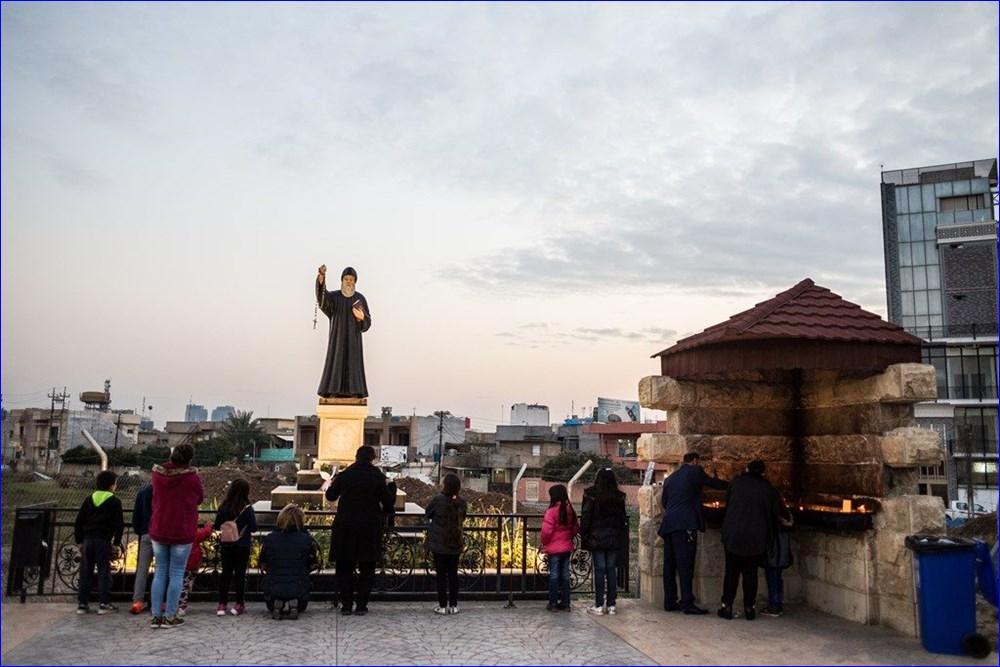


 Giacomo Sini)
Giacomo Sini)
The suburb hosts many bars, nightclubs, and live belly-dancing shows. Eighty kilometres away lies in Mosul, where, during the short-lived reign of Islamic State (IS), churches and homes were destroyed and their inhabitants killed or displaced.
Related: Timeline of ISIS in Iraq
Related: Attacks on Assyrians in Syria By ISIS and Other Muslim Groups
The Aziz family, regular worshippers at Mar Elia, a church in Ankawa, vividly remember their untimely and unforeseen journey. "In the evening of 4 June, in 2014, my company's janitor informed me that a relative of his had joined IS, and we should leave, because that meant they had already spotted my house and my company," Nashwan Aziz, a father of three, says.
"We just packed a few suitcases and jumped in the car. . . We did not leave our home until we were sure there was no other way. We weren't afraid of death: we left to save our faith."
Members of the family are among the remaining 300,000 Christians in Iraq. Together with 500,000 other refugees, they abandoned their houses to take shelter in safer cities in the Kurdistan Autonomous Region. Because the schools, hostels, and other public buildings were crammed with refugees, Mr Aziz's family had to spend about two weeks in the courtyard of Mar Elia, while many others were in tents in the park.
The Aziz family carry painful memories of the choice given to Christians by IS: "Convert and co-operate, or stay and pay jizya [the tax levied on non-Muslim subjects permanently residing in Muslim lands]."
Mr Aziz and his family knew that neither choice would guarantee their lives. "Those IS bandits were just after people's money and valuables. Christian or Muslim, converted or not, they always had a reason to kill," Mr Aziz's wife, Antesar, says. Her voice breaks as she recounts the fate of her brother-in-law: "Trying to escape, he came across one of the IS checkpoints and found himself surrounded."
He sent texts to his family saying that he would verbally convert to Islam so that they would spare his life. "It was the only way he could reunite with his family again," Mrs Aziz says, "but he had all his savings and valuables with him in the car, which was more interesting to the jihadists than the life of a terrified convert." They never heard from him again.
At the age of 44, Mr Aziz remembers a time when Iraq was safe, and the lavish Christmas celebrations in Baghdad and Mosul were national highlights. "It was only in the aftermath of the US invasion that the radical Islamists set out to spread hateful messages," he says. Initially, those messages were too irregular and insignificant to be taken seriously, he says. Their appearance in 2014 with modern artillery and armored Humvees came as a shock to Mr Aziz and everyone around him.
Before IS came to Mosul, the couple had managed to provide a prosperous life for their children. Mr Aziz owned a truck repair and equipment company; Mrs Aziz worked as a schoolteacher. Six months after the liberation of the city, they went back to see what remained of their old house.
"Everything was gone. In the ruins which we once called home, not even a single fork was left," Mrs Aziz says. "We sold the ruins. Mosul, for us, is not a place to live any more."
They now own a house in a newly constructed residential complex for Christians which is protected by Peshmarga forces. "This house is much smaller than our past place. But it is still a home," Mrs Aziz says, while making fragrant cardamom coffee in their new kitchen. Mr Aziz has found work a small grocery shop. The family have no plans to leave Iraq.
Their daughters are doing well at school, and their son helps them in the shop after finishing his homework. Mrs Aziz is planning to grow flowers in their garden, and, every time they go to Mar Elia, the family buys new religious figurines from the church's shop to decorate their new home.

or register to post a comment.